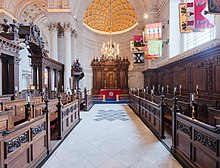Achapel(fromLatin:cappella) is aChristianplace of prayer andworshipthat is usually relatively small. The term has several meanings. First, smaller spaces inside a church that have their ownaltarare often called chapels; theLady chapelis a common type of these. Second, a chapel is a place of worship, sometimesinterfaith,[1]that is part of a building, complex, or vessel with some other main purpose, such as aschool,college,hospital,palaceor large aristocratic house, castle,barracks,prison,funeral home,cemetery,airport,or a military or commercialship.[2]Third, chapels are small places of worship, built as satellite sites by a church or monastery, for example in remote areas; these are often called achapel of ease.A feature of all these types is that often noclergywere permanently resident or specifically attached to the chapel.


For historical reasons,chapelis also often the term used by independent ornonconformistdenominations for their places of worship in England and especially in Wales, even where they are large and in practice they operate as aparish church.[3][4]
Theearliest Christianplaces of worship are now often referred to as chapels, as they were not dedicated buildings but rather a dedicated chamber within a building. Most larger churches had one or more secondary altars which, if they occupied a distinct space, would often be called a chapel. InRussian Orthodoxtradition, the chapels were built underneath city gates, where most people could visit them; a famous example is theIberian Chapel.
Although chapels frequently refer to Christian places of worship, they are also found inJewish synagoguesand do not necessarily denote a specific denomination. In England—where theChurch of Englandis established by law—interdenominationalor interfaith chapels in such institutions may be consecrated by the local Anglican bishop. Chapels that are not affiliated with a particular denomination are commonly encountered as part of a non-religious institution such as a hospital, airport, university or prison.[5]Many military installations have chapels for the use of military personnel, normally under the leadership of amilitary chaplain.[6]
History
editThe earliest Christian places of worship were not dedicated buildings but rather a dedicatedchamberwithin a building, such as a room in an individual's home. Here one or two people could pray without being part of a communion/congregation. People who like to use chapels may find it peaceful and relaxing to be away from the stress of life, without other people moving around them.
The wordchapel,like the associated wordchaplain,is ultimately derived fromLatin.[7]More specifically, the word is derived from arelicofSaint Martin of Tours:traditional stories about Martin relate that while he was still a soldier, he cut his military cloak in half to give part to a beggar in need. The other half he wore over his shoulders as a "small cape" (Latin:cappella). The beggar, the stories claim, was Christ in disguise, and Martin experienced a conversion of heart, becoming first a monk, then abbot, then bishop. This cape came into the possession of theFrankishkings, and they kept the relic with them as they did battle. The tent which kept the cape was called thecapellaand the priests who said dailyMassin the tent were known as thecapellani.From these words, viaOld French,we get the names "chapel" and "chaplain".
The word also appears in theIrish language(Gaelic) in the Middle Ages, as Welsh people came with theNormanandOld Englishinvaders to the island of Ireland. While the traditional Irish word for church waseaglais(derived fromecclesia), a new word,séipéal(fromcappella), came into usage.
In British history, "chapel" or "meeting house"were formerly the standard designations for church buildings belonging to independent orNonconformistreligious societies and their members. They were particularly associated with the pre-eminence of independent religious practice in rural regions of England and Wales, the northern industrial towns of the late 18th and 19th centuries, and centres of population close to but outside the City of London. As a result, "chapel" is sometimes used as an adjective in England and Wales to describe the members of such churches: for example in the sentence "I'm Chapel."[citation needed]
Types of chapel
edit- Abridge chapelis a small place of Christian worship, built either on, or immediately adjacent to, a road bridge; they were commonly established during pre-Reformation mediaeval era in Europe.
- Acastle chapel,in European architecture, is a chapel built within a castle.
- Aparecclesionor parakklesion is a type of side chapel found in Byzantine architecture.
- Acapilla posa(Posa chapel) is an architectural feature of the monastery-ensembles of Mexico in the 16th century, consisting of four vaulted quadrangular buildings located at the ends of the atrium outside them.[clarification needed]
- Acapilla abierta(open chapel) is one of the most distinct Mexican church construction forms, mostly built in the 16th century during the early colonial period.
- Aproprietary chapelis one that originally belonged to a private individual. In the 19th century they were common, often being built to cope with urbanisation. Frequently they were established by evangelical philanthropists with a vision of spreading Christianity in cities whose needs could no longer be met by the parishes. Some functioned more privately, with a wealthy person building a chapel so that they could invite their favorite preachers.[8]They are anomalies in the English ecclesiastical law, having no parish area, but being permitted to have an Anglican clergyman licensed there. Historically many Anglican churches were proprietary chapels. Over the years they have often been converted into normal parishes.
- Acourt chapelis a chapel as a musical ensemble associated with a royal or noble court. Most of these are royal (court) chapels, but when the ruler of the court is not a king, the more generic "court chapel" is used, for instance for an imperial court.
- Aroyal chapelis a chapel associated with amonarch,aroyal court,or in aroyal palace.
Modern usage
editWhile the wordchapelis not exclusively limited toChristianterminology, it is most often found in that context. Nonetheless, the word's meaning can vary by denomination, and non-denominational chapels (sometimes called "meditation rooms" ) can be found in many hospitals, airports, and even theUnited Nations headquarters.Chapels can also be found for worship inJudaism.
"Chapel" is in particularly common usage in theUnited Kingdom,and especially inWales,forNonconformistplaces of worship;[9]and inScotlandandIrelandforRoman Catholicchurches. InEnglandand Wales, due to the rise in Nonconformist chapels during the late 18th and early 19th centuries, by the time of the1851 census,more people attended the independent chapels than attended the state religion's Anglican churches.[citation needed](The Anglican Church does not function as the established church in Scotland.)
In Roman Catholic Church canon law, a chapel, technically called an "oratory",is a building or part thereof dedicated to the celebration of services, particularly the Mass, which is not a parish church. This may be a private chapel, for the use of one person or a select group (a bishop's private chapel, or the chapel of a convent, for instance); a semi-public oratory, which is partially available to the general public (a seminary chapel that welcomes visitors to services, for instance); or a public oratory (for instance, a hospital or university chapel).
Chapels that are built as part of a larger church are holy areas set aside for some specific use or purpose: for instance, many cathedrals and large churches have a "Lady chapel"in the apse, dedicated to theVirgin Mary;parish churches may have such a Lady chapel in a side aisle or a "chapel of Reservation" or "Blessed Sacramentchapel "where the consecrated bread of theEucharist is kept in reservebetween services, for the purpose of taking Holy Communion to the sick and housebound and, in some Christian traditions, for devotional purposes.
Types
editCommon uses of the word chapel today include:
- Ambassador's chapel – originally created to allow ambassadors from Catholic countries to worship whilst on duty inProtestantcountries.
- Bishop's chapel – in Anglican and Roman Catholiccanon law,bishops have the right to have a chapel in their own home, even when travelling (such personal chapels may be granted only as a favor to other priests)
- Cappella gentilizia- a type of private mortuary chapel used for burials; commonly found in the cemeteries of Italy.
- Chapel of ease– constructed in large parishes to allow parishioners easy access to a church or chapel.
- Chapel of rest – not a place of worship as such, but a comfortably decorated room in afuneral director's premises, where family and friends can view the deceased before a funeral.
- College chapel - located on college or university campuses that are or were once affiliated with a religion
- Family chapel - rivate chapel for royal families are other wealthy families.
- Funeral chapel – a venue forfuneralsat a funeral home, cemetery or crematorium.
- Hospital chapel – location for praying for the sick or recently deceased.
- Lady chapel– really a form of side chapel, but notable separately as such chapels are common in theRoman Catholic Churchand theAnglican Communion.They are dedicated to thevenerationof theBlessed Virgin Mary.
- Military chapel – U.S. military bases often have chapels designated for use by varying denominations. As no specific denomination or faith is the "owner", such a site is commonly referred to as a chapel instead of a church, mosque, or synagogue. Service members can often receive services for nondenominational Christian, Roman Catholic, Islamic, and Jewish faiths, as well as information for other services in the local area.
- Multifaith chapel– found within hospitals, airports and universities, etc.; often converted from being exclusively Christian.
- Side-chapel – a chapel within a cathedral or larger church building.
- Summer chapel – a small church in a resort area that functions only during the summer when vacationers are present.
- Wayside chapel or country chapel – small chapels in the countryside
- Wedding chapel– a venue forweddings.
The first airport chapel was created in 1951 inBostonfor airport workers but grew to include travelers. It was originally Catholic, but chapels today are often multifaith.[10]
Notable chapels
editGallery
editThis sectioncontains an unencyclopedic or excessive gallery of images. |
-
Teller Chapel inTartu,Estonia
-
Chapelle Saint-Sixte d'Eygalières,Bouches-du-Rhône,Provence,France
-
St. Dimitrius Chapel on the beach ofOlympiaki Akti,Greece
-
Methodist Chapel inKent, Ohio,United States
-
Confederate Memorial Chapel,Richmond, Virginia,United States
-
Vassar Chapel Interior,Vassar College,Poughkeepsie, New York
-
Interior of Heinz Chapel,University of Pittsburgh
-
Forest chapel inHeiligendamm,Bad Doberan, Mecklenburg-Vorpommern, Germany
-
Processional Chapel inVarennes,Quebec
-
Turvey Abbey,chapel interior
-
Open Chapel inSteinfurt,Germany
-
Eton College Chapel inEton College,England
-
Avon Old Farms School- the chapel
-
Chapel in the Wood,Strawberry Hill House,near London
-
Chapel in the Armenian Cathedral Deir Ez Zor
-
Gothic Chapel (15th century) in TheChrobry Square,Police,Poland
-
Guards Chapel, Wellington Barracks,London, largely rebuilt after bombing in 1944
-
Cappella degli Scrovegni inPadua,Italy
-
Chapel atCallaway Gardensin holiday resort
-
German castle chapel
-
Memorial Chapel atLake Junaluska
-
The modernist presidential chapel (left) at thePalácio da Alvorada,the official residence of thePresident of Brazil
-
Funeral chapel at Woodlands Crematorium,Scarborough,England
See also
editReferences
edit- ^"Muslim prayers welcome at Pentagon chapel".CNN.Archivedfrom the original on 7 March 2016.Retrieved3 March2016.
- ^"CATHOLIC ENCYCLOPEDIA: Chapel".www.newadvent.org.Archivedfrom the original on 9 March 2021.Retrieved10 April2005.
- ^Wakeling, Christopher (August 2016)."Nonconformist Places of Worship: Introductions to Heritage Assets".Historic England.Archived fromthe originalon 28 March 2017.Retrieved28 March2017.
- ^Jones, Anthony (1996).Welsh Chapels.National Museum Wales.ISBN9780750911627.Retrieved28 March2017.
- ^Hewson, Chris (1 January 2010)."Multi-faith Spaces: Symptoms and Agents of Religious and Social Change".University of Manchester.Retrieved14 September2012.
- ^"Royal Army Chaplains' Department".www.army.mod.uk.The British Army. Archived fromthe originalon 19 March 2017.Retrieved28 March2017.
- ^"Definition of CHAPEL".www.merriam-webster.com.Archivedfrom the original on 1 January 2019.Retrieved31 December2018.
- ^"Church Society - About - Our Work - St James' Church".Archived fromthe originalon 9 May 2008.Retrieved15 October2008.
- ^Also known, perhaps disparagingly, asEbenezers–"Ebenezer".Oxford English Dictionary(Online ed.).Oxford University Press.(Subscription orparticipating institution membershiprequired.)
- ^Cadge, Wendy (3 January 2018)."As you travel, pause and take a look at airport chapels".The Conversation.Archivedfrom the original on 13 January 2018.Retrieved12 January2018.
- ^"Cathedral | Christ Church, Oxford University".Chch.ox.ac.uk.Archivedfrom the original on 5 March 2016.Retrieved4 March2016.
External links
edit- Media related toChapelat Wikimedia Commons
- .Encyclopædia Britannica.Vol. 5 (11th ed.). 1911.
- Russian chapels photo gallery